
- Scholarships


How to Get Travel Scholarships, Grants, Fellowships & More

The GoAbroad Writing Team is a collection of international travel writers with decades of experie...
- button]:border-none [&>button]:bg-white [&>button]:hover:cursor-pointer [&>button]:hover:text-cyan-400"> button]:hover:text-cyan-400 [&>button]:bg-white hover:cursor-pointer" height="1em" width="1em" xmlns="http://www.w3.org/2000/svg">
Money can’t buy you love, but it CAN buy you international plane tickets. So…Love shmove!
Let’s get real for a sec. Travel ain’t free and it certainly ain’t (always) cheap. If you want to see the world—I mean really see it—you’re gonna have to spend some $$$. In a perfect world, international airfare wouldn’t drive us to Google “how much will my kidney sell for?” And that’s WITH all the amazing flight deal hacks !
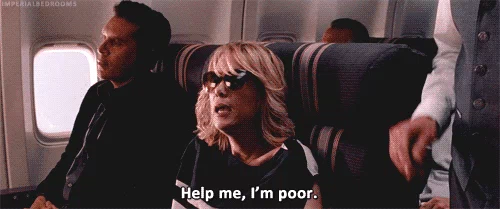
Us, once we see the cost of our dream program abroad.
So, how are we, the not-Beyonce’s of the world, supposed to afford to study, intern, volunteer, or teach abroad? How do we go from being trifling good-for-nothing type of brothers to a baller?
Travel. Scholarships. Grants. Fellowships.
That’s right, now you can pay your bills and now we DEFINITELY can chill. None of this maxing out cards and acting dumb when the bill comes. Nah-uh. We’re not playing Bey like that. You can apply for scholarships to travel abroad—no joke.
Don’t believe me? Watch the video and read the transcript below. Our travel experts lay out exactly how you can use travel grants, fellowships, and scholarships to make ALLLLLL your adventures come to life.
Video transcript
The only thing more stressful than packing four months of junk into a suitcase is applying for travel scholarships. Deadlines, eligibility factors, essays—trying to impress someone enough in 500 words or less so that they will literally help fund your dreams is a daunting experience.
DON’T WORRY. WE GOT YOU.
Let’s chat SCHOLARSHIPS, y’all! That’s right, you can get FREE MONEY to study, volunteer, intern, get your TEFL certificate, etc.
One more time: Free. Money.
We’re here to tell you about how GoAbroad can help you find travel scholarships to make all your travel dreams come true. So if you have one, wait, I promise it’ll come true! That’s why we put this how-to video together to help you find the right student travel scholarships, get your application game up to snuff, and watch that free money come rollin’ on in.
What kinds of travel fellowships, scholarships, & grants are there?
There’s academic scholarships to travel abroad , which is great if you love report cards—for you smarties out there!
Athletic scholarships for travel are a slam dunk! Now you don’t have to be a pro, but if you’re really good and play a sport in college this might be the right scholarship for you.
Is your ethnicity or gender under-represented in travel? Demographic scholarships to travel abroad are for you.
Destination based student travel scholarships —different countries have different scholarships for international students. [So be sure to check those out]
Find a scholarship based on your field of study. [AKA— major-specific travel scholarships for college students. ]
Do you receive the Pell Grant or other financial aid? Then, apply for need-based travel scholarships .
OR, your alma mater could hook you up with university-specific scholarships to travel abroad . And to help undergraduate students afford to take on unpaid or underpaid summer internships, study abroad programs, or service trips abroad, or even summer research. There’s just heaps of options! I could go on and on and on all day.

Stop doodling and dreaming, and start doing! Seriously, those applications won’t finish themselves.
Where can I find travel scholarships for college students?
We’re glad you asked! We’ve got a handy dandy little thing over at GoAbroad called a “ Scholarships Directory .” This is your go-to for all things travel scholarships! Again: Go. Abroad. Scholarships directory. Filter your search by experience to find great opportunities across the web, all in one place.
PRO TIP: For those of you still in school, if you haven’t popped by your international programs or financial aid offices, you better make an appointment! It’s right there, it’s easy to use, they’ll be there with you throughout the whole process and you’ll be on your way to your next adventure in no time.
How do I apply for travel grants, fellowships, & scholarships without wasting my time?
Another great question, class! Very nice! My mother’s always told me that if you’re not nervous about a job interview, then you probably don’t really care about the job. I think the same thing stands true for a lot of other things as well. [**Like applying for scholarships to travel abroad.]
Here are a few insider tips so that you don’t waste your time, and, you’re ultimately getting the most bang for your buck! (Buck for your bang???—Whatever, here’s how to kick ASS at scholarship apps.)
Get organized! Put everything in one place—Google drive, a spreadsheet, or an *actual* folder with printed materials. [Whatever your style is, just make sure you have everything together and easy to find.]
DUE. DATES. DO MATTER. They do, do, do, okay? So mark all your due dates and create reminders for them one or two weeks out. You don’t want to be scrambling to get everything together last minute. Trust me, it’s not enjoyable.
Ask for letters of recommendation. Now this could be something from your past boss or your teacher. Some scholarships will require letters of recommendation. Start this process early to give recommenders plenty of time to craft a meaningful letter for you. [Plus, if one falls through, you’ll want time to queue up a backup!]
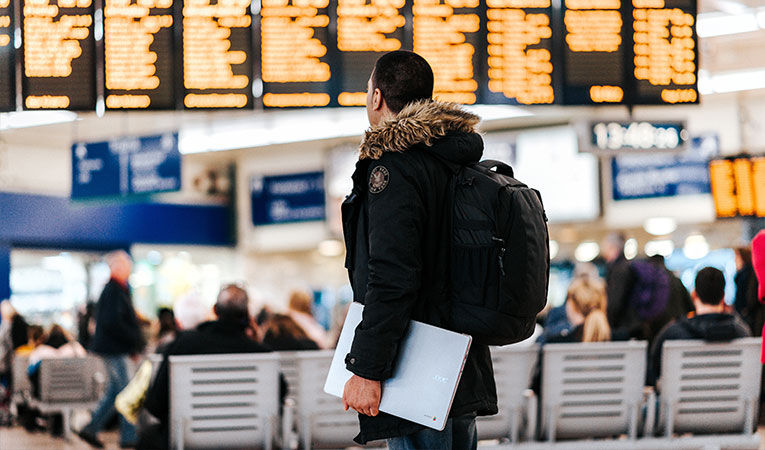
Next stop: Adventure abroad!
Craft a KILLER application essay. Yes, you have to write. This is like, 90% of the application, right? You’ll need to check the specifics of each prompt. Some might be looking for a personal narrative, some might want you to answer a very specific question or speak to a current event or major world issue. In order to get the dough you gotta put in the time.
- Understand your goals — ask yourself why this experience is important, what will you bring to the table, and what do you expect to take away from the experience.
- Outline your essay —but like, seriously. Even if it starts only as “Intro, body, and conclusion,” at least you need to know where you’re headed so you don’t end up submitting a two-page ramble about nothing.
- Then you want to edit, edit, edit.
- Edit again, edit again, and edit AGAIN. There’s going to be no typos for you. You want to look professional and you want to look smart.
- Send your draft to someone you trust to give you feedback and edit it, again. Like your mom, or your English teacher.
- ONE LAST TIME. Review submissions requirements so you know you’re following all the directions and submitting your essay in the correct format.
Submit all of your materials. (Early, you pro!) and await your fate! Good luck! Now, waiting for your acceptance letters can be anxiety inducing. So, check with your scholarship offices about when you can expect to hear a decision by, and keep yourself as busy as you can while you’re waiting.
Are travel fellowships worth all the fuss?
PFFFT. Is it worth it? Are overpriced avocados low-key the worst? Is Beyonce an angel we don’t deserve? Could your brow game be even stronger? YAS. Of course travel scholarships are worth it.
They make meaningful travel that much more affordable by helping you cover the pesky costs of things like: round trip flights, housing, FOOOOOD, your new backpack. That stuff adds up quick. It’s a really great resource for students to take advantage of because it really opens up a whole world of opportunities.
You know, that way you can save your hard-earned cash for fun stuff! Like weekend trips with new friends! Or that visit to the Van Gogh museum! You might even fall in love with a country and decide to move there permanently. Hey! That’s how I ended up here in Namibia. Apply to travel scholarships for college students so you can get out there and make all this fun, and life-changing stuff happen.
Next...next steps to scoring free money for travel

Ri-ri knows you if you want that $$$, you better werk.
Listen, we were all pretty clear about what you’ve got to do in order to get that sweet, sweet cash money, but we’ve got some more resources for you either way.
- Looking for study abroad scholarships? Check out the COMPLETE guide.
- 8 hot scholarships for study abroad
- 12 study abroad scholarships for LGBT students
- 40 scholarships for study abroad around the world
- 5 (more) scholarships for underrepresented students
- Write an award winning study abroad scholarship essay with these tips
Now you’re ready to ROCK those applications.
Go out and get your travels funded!
Stop dilly dallying. Those due dates are coming up! So reach out to your recommenders and start tip-tapping away on your keyboard. Those travel scholarships application essays won’t write themselves! Your next great adventure awaits.
Explore ALL Travel Abroad Scholarships

Explore Scholarships Programs on GoAbroad.com
Related Articles

By Raquel Thoesen | 1 day ago

By Erin Oppenheim | 6 days ago

By Maima Faith Merin | April 6, 2024

By Emily Wood | April 4, 2024
Popular Searches
Study abroad programs in italy, study abroad programs in spain, marine biology study abroad programs, study psychology abroad, fall study abroad 2024, spring study abroad programs, recommended programs.

2569 reviews
International TEFL Academy

1682 reviews
International Volunteer HQ [IVHQ]

1919 reviews
MAXIMO NIVEL

563 reviews
Intern Abroad HQ
For Travelers
Travel resources, for partners.

© Copyright 1998 - 2024 GoAbroad.com ®
- Study Abroad
- Volunteer Abroad
- Intern Abroad
- Teach Abroad
- TEFL Courses
- Degrees Abroad
- High School Abroad
- Language Schools
- Adventure Travel
- Jobs Abroad
- Online Study Abroad
- Online Volunteer Programs
- Online Internships
- Online Language Courses
- Online Teaching Jobs
- Online Jobs
- Online TEFL Courses
- Online Degree Programs
- Credit cards
- View all credit cards
- Banking guide
- Loans guide
- Insurance guide
- Personal finance
- View all personal finance
- Small business
- Small business guide
- View all taxes
You’re our first priority. Every time.
We believe everyone should be able to make financial decisions with confidence. And while our site doesn’t feature every company or financial product available on the market, we’re proud that the guidance we offer, the information we provide and the tools we create are objective, independent, straightforward — and free.
So how do we make money? Our partners compensate us. This may influence which products we review and write about (and where those products appear on the site), but it in no way affects our recommendations or advice, which are grounded in thousands of hours of research. Our partners cannot pay us to guarantee favorable reviews of their products or services. Here is a list of our partners .
How To Pay for Study Abroad

Many or all of the products featured here are from our partners who compensate us. This influences which products we write about and where and how the product appears on a page. However, this does not influence our evaluations. Our opinions are our own. Here is a list of our partners and here's how we make money .
Studying abroad in college is a unique opportunity to expand your horizons, build valuable skills and prepare for the global workforce — and it might be more affordable than you think.
An exchange program offered by your U.S. university could be the easiest and most affordable route, since your school will already know how to process your financial aid for these programs. For many U.S. students, study abroad costs can be comparable to those of your home university, thanks to scholarships, student loans and other types of financial aid.
Though there are many ways to pay for study abroad, it’s best to minimize the amount of money you borrow. Here are the top ways to pay.
» MORE: How to study abroad in college
Student loans from our partners
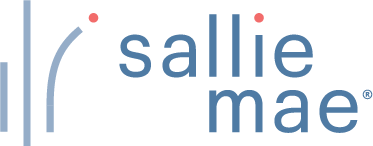
on Sallie Mae
4.5% - 15.49%
Mid-600's
on College Ave
College Ave
4.07% - 15.48%
4.09% - 15.66%
Low-Mid 600s
12.9% - 14.89%

13.74% - 15.01%

5.24% - 9.99%
5.49% - 12.18%

on Splash Financial
Splash Financial
6.64% - 8.95%
4.07% - 14.49%
5.09% - 14.76%
4.11% - 14.3%

6.5% - 14.83%
Apply for study abroad scholarships
Consider applying for scholarships and grants, which are a type of “gift aid” you won’t need to pay back. The State Department’s USA StudyAbroad website lists dozens of study abroad scholarships offered by both the U.S. and foreign governments. Your home institution’s study abroad office may also have a list of suggested scholarships.
You can typically use the need-based Pell Grant to pay for study abroad, as long as your program takes place during a standard academic term. Undergraduate students who receive Pell Grants can also apply to the State Department’s Benjamin A. Gilman International Scholarship . It awards students up to $5,000 to pay for study abroad, or up to $8,000 if they study a “critical need” language while abroad.
» MORE: Not sure where to study abroad? Explore the top destinations for U.S. students
Explore institutional aid
Your U.S. college might offer special loans and grants to help students study abroad.
For example, Syracuse University distributes short-term loans to students with financial need to cover the cost of a plane ticket to their program, which students repay without added interest once financial aid funds hit their bank accounts. The University of Wisconsin-Madison awards scholarships of up to $5,000 to its students who participate in semester-long study abroad programs.
Check with your study abroad office for more information.
» MORE: Can college abroad actually save you money?
Check 529 account rules for study abroad
If your parents contributed to a 529 college savings account , you may be able to use those funds for study abroad. Generally, you can use 529 money to cover standard expenses like tuition, program fees, housing and textbooks when studying abroad. Additional costs like transportation, international health insurance, weekend travel and basic daily living expenses aren’t eligible for 529 funds.
529 withdrawal rules vary by state. If you use 529 funds for non-qualified study abroad expenses, you'll have to pay taxes and a 10% penalty on the earnings.
» MORE: Is studying abroad worth it?
Pull from your savings
If you have remaining costs after scholarships and other gift aid, consider tapping your savings before turning to student loans, which you’ll have to pay back with interest.
You can get creative to build out your savings account before you study abroad. Ask relatives to contribute to a study abroad fund instead of giving you holiday gifts, and thank them for their support. Hold a carwash or yard sale. Get a part-time job over the summer. Request your sibling pay you for use of your car while you’re gone.
» MORE: 25 ways to make money online, offline and at home
Use federal student loans
If you’re eligible to receive federal financial aid at your U.S. university, you may be able to use it for study abroad. That includes all types of federal student loans . If your study abroad program is more expensive than your home university, you may also be able to request a larger financial aid package through your financial aid office.
Your college will process your study abroad financial aid, so federal student loans are typically available only for exchange programs or other study abroad programs sponsored by your university. Check with your study abroad or financial aid office if you have any questions.
You must submit the Free Application for Federal Financial Aid ( FAFSA ) in order to qualify for loans and grants from the government.
Consider private student loans
If you have exhausted all other funding options, private student loans can help you fill in gaps. Lenders like College Ave and Sallie Mae offer student loans that can be used for study abroad.
» MORE: Federal vs. private student loans
Private loans should be a last resort. They don’t typically offer the same protections and perks as federal student loans, like loan forgiveness programs or monthly payments capped at a certain percentage of your income.
On a similar note...

- College Study Abroad
Study Abroad Scholarships

Take advantage of scholarships for students with demonstrated financial need, proven academic merit, and for specific CIEE programs
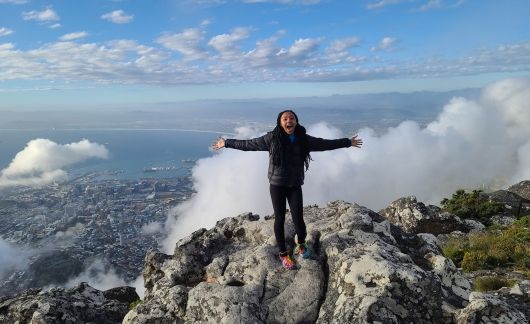
Study Abroad Scholarships & Grants
We award over $13 million in study abroad scholarships & grants annually.
We get it. Funding your study abroad program can be an overwhelming process. At CIEE, our goal is to award study abroad scholarships and grants to college students across three categories: need-based, merit-based, and other areas of funding.
By simply completing the Scholarships & Grants portion of your study abroad application , our team determines the best scholarship and grant opportunities for you. Receiving financial assistance for study abroad is as simple as that!
Important Scholarship & Grant Deadlines
Summer & Fall Programs - April 1
Benjamin A Gilman International Scholarship deadline - March 7
Spring Programs - October 15
Scholarships & Grants to Study Abroad
Need-based scholarships.
Our need-based study abroad scholarships are based on students' Estimated Family Contribution (EFC) from their Free Application for Federal Student Aid (FAFSA) and enrolled institution.
For need-based grants, you will not need to complete the essay section under the Scholarships & Grants portion of your application , but will need the following items to be considered for all awards to which you are eligible:
- The Estimated Family Contribution (EFC) number from your most recent Free Application for Federal Student Aid (FAFSA) Student Aid Report (SAR)
- For the CIEE Gilman Go Global Grant, you must provide proof your Benjamin A. Gilman International Scholarship
Note: EFC (Expected Family Contribution) is being replaced by SAI (Student Aid Index) for the 2024-2025 FAFSA cycle. Due to unexpected FAFSA delays during the transition, CIEE will accept the 2023-2024 FAFSA (EFC) or the 2024-2025 FAFSA (SAI) for Fall 2024. For students who provide the 2023-2024 FAFSA (EFC), we will continue to guarantee GAIN Travel Grants to those with EFCs of 10,000 or less. For students who provide the 2024-2025 FAFSA (SAI), we will guarantee GAIN Travel Grants to Pell Eligible students. Applications must received by the April 1st deadline for the guarantee. Students with high need should still apply even if they do not meet the criteria noted above.
Merit Scholarships
Merit study abroad scholarships are based on academic achievement.
To receive a merit scholarship, you must complete the Scholarships & Grants portion of your program application , along with an essay, to be considered for all awards to which you are eligible.
- Under the essay section of the Scholarships Application, you need to explain to us (in 300 words or less) how your CIEE program will impact your college experience and/or future career plans
- Complete the G.P.A. and transcript sections of the program application before you submit the Scholarships Application
Other Scholarships
Other awards are based on program or alumni status.
Scholarships & Grants by Term
Semester scholarships.
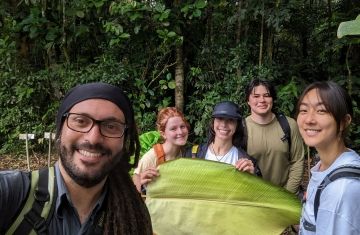
Scholarships for fall and spring semesters abroad
Summer Scholarships
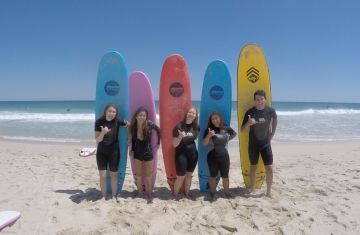
Scholarships for summer study abroad programs
Quarter Scholarships

Scholarships for quarter school schedules
Single Block Scholarships

Scholarships for one block
Frequently Asked Questions About Study Abroad Scholarships & Grants
If you’re wondering how to get a scholarship to study abroad, follow these three simple steps:
- Search for your dream program and start an application
- Review CIEE scholarships and grants
- Complete the Scholarships & Grants portion of your application
For more detailed instructions on how to apply to merit-based and need-based scholarships, check out How To Apply To Scholarships or read our blog post: How to Apply to a Study Abroad Scholarship at CIEE: 4 Steps .
CIEE makes study abroad scholarships and grants accessible to all students, regardless of where they choose to study. Whether you’re looking for study abroad grants or scholarships in Italy , South Korea , Argentina , South Africa , Australia – and so much more – CIEE offers funding to all students looking to study abroad that qualify for funding.
While the best scholarship for studying abroad is up to you, CIEE offers a wide variety of scholarships for summer, semester, quarter, internship, and single block programs. CIEE scholarships and grants range in value from $200 for our Refer-a-Friend Reward to $2,500 for scholarships like our Gilman Go Global Grant and Ping Scholarship for Academic Excellence.
Students could also receive full funding for their study abroad program if they apply to the Frederick Douglass Global Fellowship , which covers 100% of the program fee and travel costs.
No, it is not hard to get scholarships and grants for study abroad programs from CIEE. Getting scholarships for a CIEE study abroad or global internship program is a simple three step process:
- Search for and apply to your dream program
- Review CIEE scholarships and grants
- Complete the Scholarships & Grants portion of your application
Select study abroad scholarships and grants are awarded to students based on financial need, proven academic merit, and for specific CIEE program areas. Some scholarships are awarded based on your FAFSA, program selection, or alumni information, while other scholarships and grants may require a short personal essay.
Materials needed to apply for study abroad funding with CIEE vary across need-based grants and merit scholarships.
For need-based grants , students will not need to complete the essay section under the Scholarships & Grants portion of their application, but will need the following items:
- For the CIEE Gilman Go Global Grant, you must provide proof your Benjamin A. Gilman International Scholarship
For merit scholarships , students will not need to provide any financial data, but instead must:
- Under the essay section of the Scholarships Application, you need to explain to us (in 300 words or less) how your CIEE program will impact your college experience and/or future career plans
- Complete the G.P.A. and transcript sections of the program application before you submit the Scholarships Application
Get Started
Search for and apply to your dream program anywhere in the world (Exciting!)
Review all available funding opportunities (Take your time; really read through them.)
Complete the Scholarship & Grants portion of your application (It’s that easy!)
Things to Remember
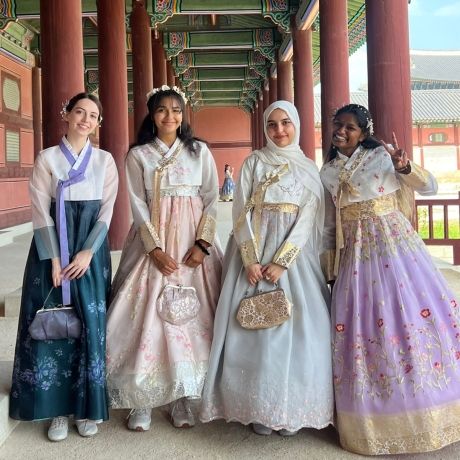
Important - Check Deadlines & Qualifications
Watch out! Scholarship deadlines can come up faster than you think. All students applying for CIEE funding must complete the CIEE Study Abroad Scholarships & Grants task on their application by the published deadline. Applications completed after CIEE deadlines will be reviewed on a case-by-case basis and funding may not be awarded.

Scholarships & Grants Caps
Scholarship and grant totals cannot exceed the caps established for each term. If you are selected for multiple awards, CIEE may need to reduce the size of your awards to stay within the maximum cap amounts listed below.
Spring : $5,000 Fall : $5,000 Summer : $2,500 One Block : $2,500 Two Blocks (Quarter) : $4,000 Three Blocks (Semester) : $5,000
January: no CIEE funding
- Terms & Conditions
**Need-Based Grants: Students must submit their CIEE Scholarships & Grants application by these dates and provide proof of an eligible application to the Benjamin A. Gilman International Scholarship. ***Need-Based Grants: Students with an EFC of 10,000 or less must submit their CIEE Scholarships & Grants application by these dates to be guaranteed a GAIN Travel Grant. Students with EFCs above 10,000 should still apply, but they will be considered after the Scholarships and Grants Deadline. The GAIN Travel Grant is valid toward outbound and return airfare on CIEE programs. This is a credit with our partner travel agency and has no cash value. If you are selected for a GAIN Travel Grant, CIEE will not reimburse you for out of pocket travel costs. If your institution covers your flights, you are not eligible for a GAIN Travel Grant.

Request Information
© 2024 CIEE. All Rights Reserved.
- Privacy Notice
Matador Original Series

31 Travel Scholarships, Fellowships, and Grants to Fund Your Next Trip Abroad
DO YOU HAVE A worthwhile project or field of study that involves traveling? If so, consider having your travels funded through a grant, fellowship, or travel scholarship.
Begin by contemplating where you want to go and potential projects you could build around those destinations. (Or vice versa.) Always wondered how sustainable agriculture works in Guam? How about local conservation practices in Central America? Once you have a clear vision of a travel / research project, begin looking for funding possibilities that give you the most freedom to pursue your goals.
When applying, take advantage of the resources and support systems you have. Your school, present or past, will have an adviser who can help you navigate the application process.
Writing grant proposals can take a lot of time, but good advice can help focus your efforts. Your school or area may even offer their own scholarship opportunities–talk to your department or your study abroad office.
Finally, even if funding from your school or other org close to home isn’t an option, you’ll find lots of other opportunities out there to fund your travel / project.
Major Grants
These are highly sought-after, competitive post-college grants that offer a full ride for a year or two of graduate study overseas.
Marshall Scholarship fully funds 2-3 years of graduate study in the UK. Open to US students finished with or finishing college.
Rhodes Scholarship funds two years of graduate study at Oxford. Includes full tuition and expenses and living stipend.
Fulbright offers year-long fellowships to American graduating seniors, grad students, young professionals and artists for study abroad or to teach English abroad. Program requirements vary by destination.
Watson Fellowship funds one year of independent research. $25,000. Open to graduating seniors from participating, small American colleges.
Program-based funding
These include grants tied to participation in the giver’s program, and can take various forms.
Institute for International Public Policy Fellowships is a five year program with study abroad component to prepare underrepresented minority undergrads for careers in international affairs. Open to US citizens or permanent residents who apply sophomore year.
Thomas R. Pickering Foreign Affairs Fellowships multi-year program also for women and members of minorities underrepresented in foreign service. Open to US citizens to apply by Feb. of sophomore year. Foreign service commitment.
Benjamin A. Gilman International Scholarship is a State Department program supporting study abroad. Up to $5000 offered to enrolled students with financial need.
Rotary Ambassadorial and World Peace Scholarships fund study and language training abroad for undergraduates and masters degrees for graduate students in international studies, peace studies, and conflict resolution to be completed at one of seven Rotary Centers. Ambassadorial grants from $11000 to $24000 depending on duration of study.
Fogarty-Ellison Overseas Fellowships in Global Health and Clinical Research from the NIH funds one year of clinical research training abroad. $25,000 plus $6000 for additional travel and materials expenses. Open to graduate students in health professions.
CIEE Scholarships offers several grants to participants in CIEE’s study abroad programs. Certain grants fund study in particular regions. Essay required upon return. Must demonstrate financial need.
AIFS Scholarships offer a variety of grants covering up to full tuition and airfare for individuals in AIFS programs.
SIT Scholarships fund participation in SIT program. $500 to $5,000. Based on financial need.
Hispanic Study Abroad Scholars reduces costs of Global Semesters programs. Open to students attending member institutions of the Hispanic Association of Colleges and Universities.
Institute for International Public Policy Fellowship is a multi-year program of summer institutes and study abroad. Funds up to 1/2 of junior year study abroad tuition. Open to underrepresented minorities.
Regional Grants
These grants are tied to study or travel in specific regions or countries of the globe.
NSEP David L. Boren Scholarship pays for undergraduate students to study in understudied areas of interest to national security. $8000 to $20000 depending on duration of study. Comes with federal government service requirement.
NSEP Boren Fellowship for graduate students. $12000 to $30000 maximum award. Federal service requirement.
Critical Language Scholarships for Intensive Summer Institutes funds study of a list of lesser-studied languages. Covers all program costs. Open to US citizens enrolled in a college or university.
The Killam Fellowships Program fund semester or academic year study in Canada. $5000/semester plus a travel allowance. Open to US or Canadian undergraduates.
George J. Mitchell Scholarship sponsors one year of graduate study at an Irish University. Funded by the US-Ireland Alliance. Includes tuition and stipend. Open to American citizens, ages 18 to 30.
BUTEX Scholarships offer $1000 for US students accepted to study at a member University of the British Universities TransAtlantic Exchange Association. Simple application due by September 1.
American-Scandinavian Foundation Awards for Study in Scandinavia offer fellowships of up to $23000 and grants of $5000 to fund study or research. Open to college graduates.
DAAD Fellowships from The German Academic Exchange offers a range of study and research grants to undergraduates and graduate students for summer or school-year study in Berlin.
Kress Travel Fellowships in the History of Art funds research in Europe towards dissertation. $3500 to $10,000. Open to American pre-doctoral students in art history
IREX Short Term Travel Grants Program Fellowships for researchers holding graduate degrees for up to eight weeks in Eurasia. Research must be broadly related to policy concerns.
Freeman Awards for Study in Asia supports study in Asia for students demonstrating financial need. $3000-$7000 based on the duration of study. Open to undergraduates with little to no experience in country of travel.
Bridging Scholarships are offered by the Association of Teachers of Japanese , to fund travel and living expenses for academic study in Japan. Grants range from $2500 to $4000.
Monbusho Scholarships available to current and graduated students between 18 and 30. Funded by the Japanese government. Short term exchange program of particular interest to current undergrad and grad students.
Huayu Enrichment Scholarship for Mandarin language study in Taiwan. Stipend of approx US$790/month. Open to overseas students who apply through their local Taiwan representative.
Halide Edip Adıvar Prize For current undergraduates who have not studied Turkey. $1000. Open to American and Canadian citizens and permanent residents.
Other funding
Phi Kappa Phi Study Abroad Grants towards study abroad. $1000. Open to all students of universities with a Phi Kappa Phi chapter.
NSF: Developing Global Scientists and Engineers offers funds for international research and study to undergrads, grad students and doctoral students in science and engineering fields. Grant
Trending Now
The 25 dreamiest airbnbs in italy, everything you need to know about going wild camping — legally, the 10 best nudist resorts around the world, 21 zion national park cabins to make your desert dreams come true, this road trip expert’s free map of 429 national park sites will vastly improve your us travels, discover matador, adventure travel, train travel, national parks, beaches and islands, ski and snow.
- Graduate School
- Student Life
Travel Grants
Travel grant applications are open until sunday, april 14, 2024, please see the travel grant schedule at the bottom of this page..
For any questions, please email [email protected] and [email protected] .
For the travel grants, we will start reviewing your applications once we receive the 2 forms below:
Student Application : https://depts.washington.edu/gpss/funding/travel-grants/student-form/
Faculty Recommendation : https://depts.washington.edu/gpss/funding/travel-grants/faculty-recommendation-form/
GPSS has allocated $30,000 to support graduate students for the 2023-24 academic year. The typical funding amounts are:
- up to $300 for travel in the U.S.
- up to $500 for international travel (please ensure you have registered your travel with UW GTS ).
- up to $300 for virtual conference registration
It is also our goal to assist as many graduate students as possible. We will score applications using this travel grants rubric . The GPSS Travel Grants Committee (TGC) comprises graduate students from various academic backgrounds, so the content of your application should be written in a style for non-experts.
Requirements / Prioritization for Travel Grants Application
- Have presentation / engage actively in the event (e.g. panel chair)
- Whether is in the final year of their study
- Attend Only
We will review applications on a rolling basis. The departmental contact is usually NOT your advisor/PI. Historically, this has caused the most delays in students receiving their travel grant. You will also need to identify one faculty recommender.
Should you have any questions, please email Linh Pham, our Budget Director, at [email protected] and cc and VP of Finance, at [email protected].
Important Notice
Please read below for specific information regarding the funding transfer in light of UW’s Financial Transformation to Workday. We recommend you share this with your Shared Environment Accountants or other fiscal support staff who will administer this funding.
- The HUB will initiate the transfer of funds to your department’s Cost Center and other provided tags (Program, Grant, Gift, Activity, or Project).
- All funds will use the Services and Activities Fee Resource (RS100298).
- Purchases made using any other Resource Tag will need to be reclassed, by your department’s Shared Environment Accountants, to use the Services and Activities Fee Resource in order to apply the Travel Grant funds to the purchase.
- Other questions pertaining to purchasing methods and funding transfers should be directed to your Shared Environment Accountants or other fiscal support staff. HUB Finance and Business Operations does not have the capacity to provide support beyond initiating the transfer.
Travel Grants Operation Timeline
Eligibility
- GPSS strongly suggested applicants to apply beforehand, at least one month in advanced is preferred due to the evaluation processing time among different unit.
Can I apply after the conference ends?
- No, we only accept applications where the event / conference is happening in the upcoming future . Application with passed event date or event date that is occurring within 10 days will not be considered, since it usually took up to at least 2 weeks for the evaluation process to be completed.
I don’t know my school’s budget number, what should I do?
- The GPSS does not have access to your department’s budget information.
- Please reach out to your department/program’s Shared Environment Accountants or other fiscal support staff who will administer the funding.
- The HUB will initiate the transfer of funds to your department’s Cost Center and other provided tags (Program / Grant / Gift / Activity / Project).
- All funds will use the Services and Activities Fee Resource tag (RS100298).
- Purchases made using any other Resource tag will need to be reclassed, by your department’s Shared Environment Accountants, to use the Services and Activities Resource tag in order to apply the Travel Grant funds to the purchase.
Eligibility
UW graduate and professional students who are currently enrolled and in good academic standing may apply for this travel grant. Applications for conferences that have already occurred will NOT be accepted.
Only one application per conference event/presentation is permitted. Though students may apply only once per conference event, students may apply as many times as they like during their UW student career for different events/presentations. Students may only receive a maximum of two awards during one’s UW graduate and professional student career.
Application Process
Application process.
The following items are required for an application to be considered complete.
https://depts.washington.edu/gpss/funding/travel-grants/student-form/
https://depts.washington.edu/gpss/funding/travel-grants/faculty-recommendation-form/
Completed applications will be reviewed within 3 weeks of submission. The Applicant is responsible for ensuring all components of the application are received by the GPSS Budget Director ( [email protected] ). Applications missing any component will not be accepted.
Grading
At least three members of the Travel Grants Committee will grade each application. The process is competitive, with an approval rate of about 45%.
Travel Grants Rubric
International Travel Registration Approval
International travel registration approval.
All International travel applicants MUST register with UW Global Travel Security for non-curricular travel ( https://www.washington.edu/globalaffairs/global-travelers/ ). Your registration may require departmental chair approval.
Travel Restrictions: https://www.washington.edu/globalaffairs/global-travelers/travel-restriction
Alternative Funding
Alternative funding.
For the times we are unable to cover travel, there is a competitive process by the UW Graduate School which offers an equivalent amount of funding as GPSS: https://grad.uw.edu/graduate-student-funding/funding-information-for-departments/awards-and-funding-resources/graduate-student-conference-travel-awards/
Past Updates Archive
[archived] february 2024 update.
Thank you for your submissions! The Travel Grants Committee received 42 complete applications, and have started reviewing the applications.
The February submission window is now closed, and we will re-open the application on February 1. Eligible travel will only include travel that will occur: (1) two weeks after date of submission or (2) after January 31, the earlier of the two.
For any questions about the Travel Grants, please email: GPSS VP of Finance, [email protected] Linh Pham, GPSS Budget Director, [email protected]
The UW Graduate School offers an equivalent amount of funding for travel as GPSS: https://facstaff.grad.uw.edu/advising-resources/funding-management/awards-funding-support/graduate-student-conference-presentation-awards/

[Archived] January 2024 Update
The January submission window is now closed, and we will re-open the application on February 1. Eligible travel will only include travel that will occur: (1) two weeks after date of submission or (2) after January 31, the earlier of the two.
[Archived] December 2023 Update
Thank you for your interest in Travel Grants. December submission window is now closed, and we will re-open the application on January 1. Eligible travel will only include travel that will occur: (1) two weeks after date of submission or (2) after January 31, the earlier of the two.
[Archived] November 2023 Update
Thank you for your interest in Travel Grants. October submission window is now closed, and we will re-open the application on December 1. Eligible travel will only include travel that will occur: (1) two weeks after date of submission or (2) after December 31, the earlier of the two.
[Archived] October 2023 Update
Thank you for your interest in Travel Grants. October submission window is now closed, and we will re-open the application on November 1. Eligible travel will only include travel that will occur: (1) two weeks after date of submission or (2) after November 30, the earlier of the two.
[Archived] August 2022 Update
Thank you for your interest in Travel Grants. We will open the application the week of September 19 with the re-launch of our website. Eligible travel will only include travel that will occur AFTER September 28, regardless of registration time.
Please send inquiries about the process to: A.J. Balatico (he/him), GPSS President, [email protected] Van Mai (she/her), GPSS VP of Finance, [email protected]
We are aware there is a gap in coverage of summer travel. The GPSS part of the process is usually very quick since we grade applications as we receive completed materials, which include the student form, conference acceptance, and faculty recommendations. However, communications with departmental budgeting staff is usually slow during the summer and we have no way of ensuring that travel funding has been received by students.
INTERNATIONAL TRAVEL UPDATE: All International travel applicants must register with UW Global Travel Security for non-curricular travel ( https://www.washington.edu/globalaffairs/global-travelers/ ). Your registration may require departmental chair approval.
[Archived] Spring 2022 Update
SPRING INTERNATIONAL TRAVEL UPDATE: All International travel applicants must register with UW Global Travel Security for non-curricular travel ( https://www.washington.edu/globalaffairs/global-travelers/ ). Your registration may require departmental chair approval. Please email proof of registration to A.J. Balatico (he/him), GPSS Vice President of Finance ( [email protected] ) and Bree Murrin (she/her), GPSS Budget Specialist ( [email protected] ).
We will not be able to take applications for travel from June 10 until late August. We cannot accept applications past this date, and we cannot approve travel past this date.
Thank you for your interest in GPSS Travel Grants. The Travel Grants Committee (TGC) has formed for the 2021-22 academic year, and has decided to funded in-person and virtual conferences, workshops, and performances.
The previous senate has allocated $25,000 to support graduate students for the 2021-22 academic year. The typical funding amounts are:
Although applications are competitive, it is also our goal to assist as many graduate students as possible. We will score applications using this travel grants rubric . The TGC comprises graduate students from various academic backgrounds, so the content of your application should be written in a style for non-experts.
We will review applications on a rolling basis. In the meantime, if you are planning to apply, please have your department’s budget or financial contact and obtain a UW budget code (##-#####) . The departmental contact is usually NOT your advisor/PI. Historically, this has caused the most delays in students receiving their travel grant. However, you will also need to identify one faculty recommender.
[Archived] Spring 2021 Update
For the duration of the suspension of in-person learning activities at the University of Washington, GPSS Travel Grants Committee will be considering applications for non-presenting attendees to remote conferences or seminars. These applications will be held to the same standards as traditional Travel Grants and reviewed on a rolling basis; applications should be reviewed within 2 weeks of submission. Any attendance grants awarded within this period will not count towards the travel funding limitations (once every three years and a maximum of two awards during one’s UW student career).
In an effort to help improve graduate and professional student life at the University of Washington, the GPSS Travel Grants Program contributes funds to qualifying individuals’ travel expenses for participation in domestic or international conferences.
The goal of this is twofold: first, to facilitate and promote the intellectual and professional development of graduate and professional students, and also to encourage mutually beneficial interaction among students and GPSS Senators. GPSS Travel Grants further contribute to the strengthening of UW and its prominence in the greater scholarly community through broadening students’ personal and academic development through exposure to the work of others elsewhere.
Students whose conference participation might otherwise be underfunded and are making fair progress towards their respective degrees are encouraged to apply. The amount of funding awarded will be based on conference location, with typical awards being up to $300 for conferences in the United States and $500 for international conferences.
The GPSS Travel Grants Committee reserves the right to make individual award adjustments based upon an applicant’s expressed need of both an individual applicant or the applicant pool as a whole.
For any questions regarding travel grants, please email [email protected] .
Graduate School
- Request Information
- Research Travel Grants
What are Research Travel Grants?
Research Travel Grants (RTG) are small grants that support research travel, both domestically and internationally, in preparation for a student’s thesis or dissertation. RTGs do not support travel to present at conferences.
Funding for these grants generously comes from the following endowments:
- Class of 1890 Fellowship
- Walter B. Cline Memorial Fellowship
- Norman J. Dewitt Memorial Award in Humanities
- Albert Howard Award
- Frieda M. Kunze Fellowship
- Patrick R. and Kathryn J. Lewis Graduate Fellowship Fund
- Eva O. Miller Fellowship
- Shevlin Fellowship
- Hugh J. and Elizabeth R. Thompson Fellowship Fund
- Alexander P. Anderson and Lydia Anderson Fellowship
HOW MUCH IS THE AWARD?
Doctoral candidates: up to $3,000
Doctoral pre-candidates: up to $1,500
Master’s students: up to $500
Grant awards do not provide tuition and/or health insurance benefits.
WHO IS ELIGIBLE TO APPLY?
- U.S. citizens, permanent residents, graduate students lawfully in the U.S. on a non-temporary basis, MN Dream Act graduate students, and International students
- Applicants must be actively pursuing a research-based graduate degree at the University of Minnesota Twin Cities or Duluth campuses
- Applicants must be enrolled in tuition-bearing credit at the graduate tuition rate during the term in which they apply
- Applicant must have research travel days during the term in which they apply
- Applicants are eligible to receive one award at pre-candidacy level (master’s or doctoral pre-candidate) and one award at candidacy level
- Master's students are ineligible if they have already received a Judd Travel Grant; cannot receive RTG and Judd Grants simultaneously
- Doctoral candidates are ineligible if they have previously received a Thesis Research Travel Grant
- Applications for conference travel will not be considered
HOW DO I APPLY?
Graduate students apply directly through the electronic application form .
WHAT IS THE DEADLINE?
Applications accepted October 1-31 for Fall research travel (selection by November 15)
Applications accepted February 1-28 for Spring research travel (selection March by 15)
Applications accepted June 1-30 for Summer research travel (selection by July 15)
WHAT ARE THE APPLICATION MATERIALS?
The applicant will upload a single PDF of the application materials in the following order:
- Research Proposal (1-page maximum), see details below
- Budget Statement
- Curriculum Vitae (2-page maximum), see details below
- IRB/IACUC Documentation, see details below
- Unofficial UMN graduate transcript
Depending on the nature and location of your proposed research, you may need to submit additional application items. Please see the FAQ below for more details.
Required PDF title format: Last Name, First Name - Name of Graduate Program
WHAT IS THE REVIEW AND LOTTERY SELECTION?
The Graduate School Fellowship Office (GSFO) and an interdisciplinary faculty review committee review all applications each cycle to determine 1) eligibility requirements are met and 2) application is recommended for funding. All applications recommended for funding will go into a lottery system, one recommended by UMN OIT, for award selection.
APPLICATION MATERIAL DETAILS
+ research proposal.
- One-page maximum , single-spaced, 12-point Times New Roman type, 1-inch margins. Key references, diagrams, or pictures may be included (they are not required) on a single additional appendix page (no formatting requirements).
- Include a working title for your research project at the top of the proposal.
- Describe your research plan in terms that are accessible to a non-specialist. Avoid jargon. If jargon must be used, please define the language.
- Explain the importance of the proposed travel and the direct impact it will have on your thesis or dissertation.
- If your research is part of a larger group project, be specific about your role and independent contribution.
+ CURRICULUM VITAE
- Two-page maximum , single-spaced, 12-point Times New Roman type, 1-inch margins
- Focus on publications, presentations, academic accomplishments, and awards
+ IRB/IACUC DOCUMENTATION
Please consult the IRB and/or IACUC webpages for additional information.
If your research involves Human or Animal Subjects, provide the date of IRB/IACUC approval and documentation of approval (1-2 pages).
If your project involves human or animal subjects but IRB/IACUC told you that approval is not needed then provide the email or letter stating this decision.
If your Advisor has IRB/IACUC approval that covers this research project then provide that approval page (1-2 pages).
If your research does not involve Human or Animal subjects then submit the Human Subjects Statement (requires Advisor signature).
If your IRB/IACUC application is still pending, provide documentation to show the submitted request (1-2 pages). Once received, IRB/IACUC approval can be submitted directly to [email protected]. If selected to receive a Research Travel Grant, funding is contingent upon proof of IRB/IACUC approval and/or decision.
+ Do I need to obtain a language evaluation to conduct my research?
If you are conducting research in another language and you are not a native speaker of the language, you will need to obtain a language evaluation. Please email [email protected] for more information.
If you are a native speaker of the language, please include a signed statement indicating the language which will be used to conduct research and that you are a native speaker of that language. You may sign this statement yourself.
+ Do I need to obtain a letter of affiliation?
Depending on the nature and location of your proposed research, you may need a letter of affiliation.
A letter of affiliation demonstrates to faculty reviewers that, if selected to receive grant funding, you will be able to successfully carry out your proposed research. Reviewers are hesitant to approve funding if there is any doubt that the research can be successfully conducted.
If you are conducting research in a library archive, museum, or other public space, you can submit an email from an employee that verifies that you will have access to the required materials. If the archive/materials in question are available to the public, you can include a copy of the webpage highlighting the pertinent information.
If you have questions about a letter of affiliation, please email [email protected] .
+ Do I need a letter of affiliation to conduct surveys?
Yes, because you will want to provide proof to reviewers that you will be able to successfully conduct your proposed research. If you are conducting surveys, please provide documentation that demonstrates your ability to connect with the appropriate resources (e.g. community, business, and/or scholarly contacts).
+ WHAT ARE THE DATES CONSIDERED FOR EACH CYCLE?
The cycles correspond to the semesters or terms in the current academic year.
Fall cycle requests are accepted for research travel start and/or end dates between September 1 - December 31.
Spring cycle requests are accepted for research travel start and/or end dates between January 1 - May 31.
Summer cycle requests are accepted for research travel start and/or end dates between June 1 - August 31.
The travel dates can span more than one term. Applicants should apply to a cycle during which they will have some or all of their travel days taking place. In addition, in order to be eligible for funding, if selected, the applicant must be enrolled in the corresponding fall semester, spring semester, or summer term in which they are applying for an RTG.
If travel dates span more than one semester, and an applicant is not selected for funding during one cycle then they can apply again during the next cycle that contains research travel dates.
+ How is the RTG funding disbursed?
Research Travel Grants (RTG) count as estimated financial aid assistance and are disbursed via scholarship upload to a recipient's student account. Once posted to the student account, and if there is no current past due balance, then the RTG will disburse into a recipient's bank account via direct deposit, if set up, or a paper check will be mailed to the address on file.
- About the Grad School
- Staff Directory
- Office Locations
- Our Campuses
- Twin Cities
- Mission & Values
- Strategic Plan
- Policies & Governance
- Graduate School Advisory Board
- Academic Freedom & Responsibility
- Academic & Career Support
- GEAR 1 Resource Hub
- GEAR+ Resource Hub
- Ask an Expert
- Graduate School Essentials
- Transferable Skills Checklist
- Grad InterCom
- First Gen Connect
- Advising & Mentoring
- Individual Development Plan (IDP)
- Three-Minute Thesis
- Application Instructions
- Application Fees
- Big 10 Academic Alliance Fee Waiver Program
- Application Status
- Official Transcripts & Credentials
- Unofficial Transcripts & Credentials
- Recommendation Letters
- International Student Resources
- Admissions Guide
- Change or Add a Degree Objective
- Readmission
- Explore Grad Programs
- Preparing for Graduate School
- Program Statistics
- Recruiting Calendar
- Funding Opportunities
- Prospective & Incoming Students
- Diversity of Views & Experience Fellowship (DOVE)
- National Science Foundation Graduate Research Fellowship
- Current Students
- Banting Postdoctoral Fellowship Program
- Distinguished Master's Thesis Competition
- Diversity Predoctoral Teaching Fellowships
- Doctoral Dissertation Fellowship
- Excellence in Teaching Award
- Fulbright U.S. Student Program
- Graduate SEED Awards
- Harold Leonard Memorial Fellowship in Film Study
- Interdisciplinary Doctoral Fellowship
- Judd Travel Grants
- Louise T. Dosdall Endowed Fellowship
- Mistletoe Fellowship
- Smithsonian Institute Fellowship
- Torske Klubben Fellowship
- Program Requests & Nominations
- Bridging Funds Program
- Best Dissertation Program
- Co-Sponsorship Grants Program
- Google Ph.D. Fellowship
- National Science Foundation Research Traineeship
- National Science Foundation Innovations in Graduate Education Program
- Training Grant Matching Funds
- Fellowship Dates & Deadlines
- Information for Staff & Faculty
- About Graduate Diversity
- Diverse Student Organizations
- McNair Scholars Resources
- About the Community of Scholars Program
- Graduate Recruitment Ambassadors Program
- Community of Scholars Program Writing Initiative
- Faculty & Staff Resources
- Diversity Recruitment Toolkit
- Summer Institute
- Diversity Office Staff
- What's Happening
- E-Publications
- Submit Content
- News Overview
- Events Overview
- Travel and Registration Grants
- Graduate & Professional Student Association /
- Student Resources /
- Financial Support /
Travel Grants
The Travel Grant Committee provides funding for graduate and professional students to enhance their professional and developmental goals through attending different activities and events, including conferences, workshops, wet labs, internships, preceptorships, courses, career fairs, etc.
For more information about WSU policies on Travel Policies and spending authorization, view the Office of Policies, Records, and Forms .
Types of Travel Grants
- Conference Presentation Travel Grant
- Wet Lab and Workshops Travel Grant
- Professional and Career Development Travel Grant
- Internship, Preceptorship, and Intercampus Travel Grant
Travel Dates and Application Deadlines
Read the table carefully and find out which travel period you need to submit your application. Learn more about choosing an application period .
GPSA Travel Grants – Appeal Process
- To guide WSU graduate & professional students about appealing award decisions for travel grant applications.
Responsibility
- It is the responsibility of the student applicant to submit an appeal for their application.
- Faculty, Travel Coordinators, or other WSU members, friends, or family are not permitted to submit an appeal on behalf of the student applicant.
- The GPSA Travel Grant Chair or their designee from the Grants Committee is responsible for the review of appeals and subsequent approval or denial. The GPSA President, including the Travel Grant Chair, may serve as a designee under extenuating circumstances deemed necessary by the Grants Committee. The Travel Grant Chair must work with [email protected] to ensure adjusted timelines can be met.
Travel Grant
You can apply for a Travel Grant to cover the extra travel costs you might have if you’re studying abroad or if you’re a healthcare student on a placement in the UK.
How much you get depends on your household income and when you started your course. You do not have to pay it back.
What’s available
You can claim reasonable costs for travel if you’re studying abroad or if you’re on a healthcare placement in the UK.
You will have to pay either the first £303 or the first £1,000 of your costs yourself, depending on your household income and when you started your course.
You should try to keep costs as low as you can, for example you should book standard class tickets instead of first class.
If you’re studying abroad
You can claim for:
- up to 3 return journeys a year between the UK and the overseas university or college
- medical insurance and travel visas.
You may be able to claim for your children’s travel costs if you’re a single parent.
If you’re a healthcare student on a placement in the UK
You can claim for travel costs between your home and the hospital or other institution where you’re doing your placement.
Who qualifies
You must either be:
- studying abroad as part of your course
- on an Erasmus+, Turing scheme or Taith study or work placement, or
- attending a medical or dental clinical placement in the UK.
You can’t claim for the same costs already reimbursed from the Taith programme, Erasmus+ or the Turing Scheme.
If you started your course on or after 1 August 2018
You must pay the first £303 of travel costs yourself if your household income is less than £59,200.
You must pay the first £1,000 of travel costs yourself if:
- your household income is £59,200 or more
- you are not getting student finance that depends on your household income.
If you started your course between 1 September 2012 and 31 July 2018
- be getting student finance that depends on your household income
- pay the first £303 of travel costs yourself.
If your household income is over £59,200, your Travel Grant will be reduced by £1 for every £5 of household income over £59,200.
How to apply
You need to submit a course abroad form:
- Course abroad form - 2024 to 2025 (Download PDF 170KB, opens in a new tab)
- Course abroad form – 2023 to 2024 (Download PDF 1108KB, opens in a new tab)
Once you’ve submitted a course abroad form, use the claim form to claim for costs you’ve paid:
- Study abroad expenses claim form - 2024 to 2025 (Download PDF 212KB, opens in a new tab)
- Study abroad expenses claim form – 2023 to 2024 (Download PDF 188KB, opens in a new tab)
You will automatically be sent the form you need after you’ve applied for student finance.
Submitting evidence
Make sure you keep copies of receipts for any costs you want to claim. You’ll need to provide these with your claim form.
For more information on sending us evidence, check out our evidence guidance page .
Getting paid
We’ll pay your money into your bank account after we’ve approved your claim.
Cookies on GOV.UK
We use some essential cookies to make this website work.
We’d like to set additional cookies to understand how you use GOV.UK, remember your settings and improve government services.
We also use cookies set by other sites to help us deliver content from their services.
You have accepted additional cookies. You can change your cookie settings at any time.
You have rejected additional cookies. You can change your cookie settings at any time.
Apply online for student finance
If you’re a student who’s from England or normally lives in England, you can apply online for the following academic years:
- 2024 to 2025 (full-time undergraduate students only)
- 2023 to 2024
Applications for 2024 to 2025 will open:
- in May 2024 for part-time undergraduate students
- in June 2024 for postgraduate students
You can apply for:
- Tuition Fee Loans
- Maintenance Loans
- Maintenance Grants (only if your course started before 1 August 2016)
You can apply up to 9 months after the start of the academic year for your course.
If you’re eligible for tuition fee-only funding , you must apply by post. You can use the form finder to find and download your form.
If you need help with a further education course at a college or training provider you may be able to apply for an Advanced Learner Loan instead.
The application process is different for students from Scotland, Wales and Northern Ireland. Check how to:
- apply for student finance in Scotland
- apply for student finance in Wales
- apply for student finance in Northern Ireland
Start now on the Student Finance England website
What you need to know
If you cannot use a computer without help but want to apply online, you can contact Student Finance England for help.
- Apply by post
It’s best to apply online. If you cannot, use the form finder to download the application forms and guidance notes you’ll need.
Problems logging in
- recover your email address or Customer Reference Number (CRN)
- reset your password
Part of Get undergraduate student finance: step by step
Step 1 : check if you're eligible.
- Check if you're eligible for student finance
There’s a different process if you’re a student from:
- Northern Ireland
- Isle of Man
Step 2 : Find out how much loan you could get
Find out the maximum tuition fee and maintenance loan you could get if you're a:
- new full-time student
- continuing full-time student
- part-time student
- student who started before 1 August 2016
How much maintenance loan you get depends on where you'll study and your household income.
- Use the student finance calculator to estimate your maintenance loan
You'll have to pay back any loan you get.
- Find out how much you'll repay
- Find out when you'll start repaying
and Check if you can get extra help
You might be able to get extra money if you:
- are under 25, have no contact with your parents and support yourself
- pay for childcare
- are a full-time student with children
- have an adult who depends on you financially
- have a disability, mental or physical health problem or learning difficulty like dyslexia
You might also be able to get other financial help, for example from your university or the government.
- Find out about extra help
Step 3 : Prepare your application
- Check when you can apply
- Check what ID you'll need
- Check if you need to give proof of your household income
Step 4 : Apply online
- You are currently viewing: Apply online
If you're eligible for Tuition Fee Loans, Maintenance Loans, or Maintenance Grants, you can apply online.
You'll need to create a student finance account if you're a new student or sign into an existing account if you're a returning student.
It can take up to 6 weeks to process your application. You might have to provide extra evidence.
or Apply by post
If you’re eligible for tuition fee-only funding, you must complete a form and send it by post instead. You cannot apply online.
You can also apply by post if you're unable to apply online.
Step 5 : Update your details if your circumstances change
You must update your application if your circumstances change. For example if you:
- change your course through clearing
- change where you're going to live - for example with your parents instead of halls
- Find out how to update your application
Step 6 : Make sure you can be paid
After you register at your university or college you'll usually get your maintenance loan paid directly into your bank account at the start of each term.
Use your student finance account to:
- update your bank details - for example if you open a student account
- check how much you'll be paid
- check when you'll be paid
- Sign in to your student finance account
Step 7 : Check what to do while you're studying
You'll need to reapply for student finance for each year of your course.
You must keep your details up to date throughout your course because some changes can affect your loan payments, for example if your household income or bank details change.
- Check how to update your details
- Find out what to do if you suspend or leave your course
Step 8 : Check what to do when you stop studying
When you stop studying the Student Loans Company (SLC) will create a student loans repayment account for you.
Make sure your contact details are up to date in your repayment account. The log in details will be the same as for your student finance account.
- Sign in to your student loan repayment account
- Update your employment details
Step 9 : Repay your loan
Is this page useful.
- Yes this page is useful
- No this page is not useful
Help us improve GOV.UK
Don’t include personal or financial information like your National Insurance number or credit card details.
To help us improve GOV.UK, we’d like to know more about your visit today. We’ll send you a link to a feedback form. It will take only 2 minutes to fill in. Don’t worry we won’t send you spam or share your email address with anyone.
Russia Travel Blog | All about Russia in English
- About our blog
- RussiaTrek.org
Sidebar →
- Architecture
- Entertainment
- RussiaTrek.org News

- Send us a tip with a message
- Support RussiaTrek.org
- Travel Guide to Ukraine
- Comments RSS
← Sidebar
Exchange Programs for Foreigners Who Want to Study in Russia
1 Comment · Posted by Alex Smirnov in Education
Nowadays, going abroad for studying is not a problem. Many countries are introducing quarantine restrictions, so taking part in a student exchange program opens an array of benefits.
Adventurous students can get not only a brilliant education but also an eye-opening travel experience. For some students, this is an opportunity to immerse themselves in the culture of another country. Moreover, a chance to improve your skills in a foreign language is an advantage.

Russia is known for its centuries-old history and classical traditions. The country can also boast its strong scientific community and high level of education. Years of educational experience combine with modern technology, comfortable campuses, and innovation laboratories.
Today, it is much easier for foreign applicants to get higher education in Russia. You can do it as easily as it would be to find a tutor or other type of external academic help online. Students can enter either on a commercial basis or with a scholarship.
Medicine, engineering specialties and IT are especially popular among the areas of studying. Foreigners also focus on economics, finance, and natural sciences. Still, for those willing to become professional writers or artists, there is a choice of more creative programs.
Below we provide you with a list of the most prestigious opportunities for those who want to get an education in Russia. Find the exchange program that suits you and make your student life unforgettable!
You might have already heard something about Erasmus. This is one of the most famous exchange programs organized by the EU. It gives the opportunity to study, internship, or teach in another country. Yet a target state must take part in the Erasmus program. The terms of study and internship vary from 3 months to 1 year each, up to 2 years in total.
The geography of Erasmus+ has expanded throughout the years. It now encompasses not only the member states of the European Union but also partner countries. These are divided into 13 geographic regions. And the Russian Federation is one of them. The country’s capital, Moscow, is famous for its array of prestigious educational institutions. The top-ranking are:
- MIPT (Moscow Institute of Physics and Technology);
- MGIMO (Moscow State Institute of International Relations);
- MEPhL (National Research Nuclear University);
- MSLU (Moscow State Linguistic University);
- REA (Plekhanov Russian Academy of Economics);
- BMSTU (Bauman Moscow State Technical University).
All these institutions of higher education cooperate with many foreign universities. This contributes to the improvement of the qualifications of students in the framework of international exchange programs, such as Erasmus+.

AIFS Study Abroad in Russia
AIFS (American Institute for Foreign Study) is a company that manages various educational exchange programs. It was founded in 1964 and has already helped more than 1.5 million students with their international education goals.
Built on the values of cultural exchange, AIFS offers foreign students an interesting opportunity to spend a semester or year in the Russian Federation. It cooperates with Peter the Great St. Petersburg Polytechnic University. Thus, many academic program options are available. The program covers arts and humanities. These are political science, history, sociology, Russian language, Classic Literature.
The period of studying is not consistent, depending on the program you choose. Have you ever admired the works of legendary Russian poets or expressed interest in the country’s history? If yes, you are welcome to take part in any of these programs.

Council of International Educational Exchange (CIEE)
CIEE partner institutions are also located in the cultural capital of the Russian Federation, Saint Petersburg. The programs are aimed at strengthening the existing skills in the Russian language. Even so, the students have the opportunity to attend lessons in the English language as well as Russian classes, depending on the level.
Apart from education, international exchange students will take part in the volunteering process. It not only allows you to use all your skills in practice but also helps to integrate into the local community.
The period of studying at St. Petersburg State University varies from 11 and up to 37 weeks. Different cultural activities are also included in the agenda.
Indeed, the city has a lot to offer: from the Hermitage Museum to the Peterhof Palace, from the Peter and Paul Fortress to the Pushkin’s Apartment Museum and the list is non-exhaustive.

SPAS is an American organization conducting international exchange programs to Russia and Eurasia. If you express interest in political studies and diplomacy, the offer of this provider is for you. SPAS cooperates with the Moscow State Institute of International Relations (MGIMO).
It is Eurasia’s leading institution for international studies. Despite the limited field of study, students can still choose the course that suits their interests. The courses available include the following subjects:
- International Relations;
- International Policy & Diplomacy;
- International Business;
- Russian Language;
- Russian & East European Studies.
The only rule for the applicants is to know the English language. This is crucial as some lessons, as well as meetings with politicians, experts, and other leaders, are in English.

KEI is the Knowledge Exchange Institute that has been serving the students’ needs since its foundation in 1997. The main goal of its programs is to provide students with an opportunity to gain industry-specific knowledge. Apart from that, it aims to give them some practical skills for the future profession.
The most popular programs at Moscow State University are connected to either medicine and health or science, mathematics, and engineering. Even so, the list of courses available for study is much more extensive.
International exchange students interested in business, culture, history, politics, or international relations will also find suitable subjects.
It is worth noting that the courses are in both Russian and English. So proficiency or at least intermediate level is necessary. The host university is MSU (Lomonosov Moscow State University). It is a leading higher educational institution not only in the Russian Federation but also in the whole world.
Final Words
Studying in the Russian Federation is prestigious and profitable. You can be sure that you will receive all the necessary knowledge in the chosen specialty. There is a wide choice of international exchange organizations providing their services.
You are only required to follow a simple scheme. Step one: choose a suitable exchange program. Step two: prepare the necessary documents. Apply and come to Russia and start studying!
Tags: No tags
You might also like:

Why You Should Visit Khamovniki District in Moscow
Church of the Vladimir Icon of the Mother of God in Balovnevo >>
Molsdsd · May 8, 2022 at 11:33 am
Hello. What’s up it’s me, I am also visiting this website daily, this website is really pleasant and the viewers are really sharing good thoughts.
Leave a Reply
XHTML: You can use these tags: <a href="" title=""> <abbr title=""> <acronym title=""> <b> <blockquote cite=""> <cite> <code> <del datetime=""> <em> <i> <q cite=""> <s> <strike> <strong>
- February 2024
- January 2024
- December 2023
- November 2023
- October 2023
- September 2023
- August 2023

IMAGES
COMMENTS
Use the travel expenses form for the academic year you studied abroad. Student Finance England will automatically send you: a Course Abroad Form if you need to fill it in. a Clinical Study Travel ...
Travel grants for students including medical and dental students - travel costs, Erasmus placements, how to apply, ... Student finance; Is this page useful? Maybe Yes this page is useful;
That's right, you can get FREE MONEY to study, volunteer, intern, get your TEFL certificate, etc. One more time: Free. Money. We're here to tell you about how GoAbroad can help you find travel scholarships to make all your travel dreams come true. So if you have one, wait, I promise it'll come true!
The steps to apply for the GAIN Travel Grant are super simple: Step 1: Students upload their FAFSA Student Aid Report. Step 2: Submit a CIEE Scholarships and Grants application by October for spring programs/April 1 for summer and fall programs. This is an incredible opportunity for students to receive some extra assistance with their travel costs!
Find grants and scholarships for studying abroad. Studying abroad can get expensive, but many scholarships are available for undergraduate and graduate students. Scholarships and grants offer a wide range of funding — from $500 to $25,000. Groups like Fund for Education Abroad and NAFSA help facilitate and fund study abroad opportunities.
The Global Access Initiative (GAIN) Travel Grant provides funds for flights to and from CIEE programs. To apply: Submit a CIEE Scholarships and Grants application by October 15 (spring programs), or by April 1 (summer and fall programs). Students with an EFC of 10,000 or less are guaranteed a GAIN Travel Grant if they meet the criteria above.
You can typically use the need-based Pell Grant to pay for study abroad, as long as your program takes place during a standard academic term. Undergraduate students who receive Pell Grants can ...
For students who provide the 2023-2024 FAFSA (EFC), we will continue to guarantee GAIN Travel Grants to those with EFCs of 10,000 or less. For students who provide the 2024-2025 FAFSA (SAI), we will guarantee GAIN Travel Grants to Pell Eligible students. Applications must received by the April 1st deadline for the guarantee.
SFE TRAVEL GRANT 22/23 updated 10/02/2022. 4. 40% of a travel insurance premium, but the insurance policy must include medical coverage; The cost of visas and medical tests that are a mandatory condition of entry to the host country; The cost of any vaccinations required; Mandatory covid-19/PCR tests required to enter a country, or to return to ...
Medicine and dentistry. If you're studying an undergraduate medicine or dentistry course, you'll get full funding from Student Finance England for the first four years of your course. From your fifth year, you'll be able to get a reduced rate Maintenance Loan from Student Finance England, and a bursary from the NHS. Find out more.
Bridging Scholarships are offered by the Association of Teachers of Japanese , to fund travel and living expenses for academic study in Japan. Grants range from $2500 to $4000. Monbusho Scholarships available to current and graduated students between 18 and 30. Funded by the Japanese government.
Student finance - student loans or student grants for tuition fees and living costs, extra help, ... a grant to cover some travel expenses if you're studying a medical or dentistry course;
GPSS has allocated $30,000 to support graduate students for the 2023-24 academic year. The typical funding amounts are: up to $500 for international travel (please ensure you have registered your travel with UW GTS ). It is also our goal to assist as many graduate students as possible. We will score applications using this travel grants rubric.
Travel grants for Northern Irish students studying abroad. Travel grants are available for Northern Irish students spending at least half a semester abroad. The exact amount you receive is dependent on your household income, but regardless of how large a travel grant you get, you'll need to pay the first £309 of costs yourself.
Research Travel Grants (RTG) count as estimated financial aid assistance and are disbursed via scholarship upload to a recipient's student account. Once posted to the student account, and if there is no current past due balance, then the RTG will disburse into a recipient's bank account via direct deposit, if set up, or a paper check will be ...
The GPSA Travel Grant Chair or their designee from the Grants Committee is responsible for the review of appeals and subsequent approval or denial. The GPSA President, including the Travel Grant Chair, may serve as a designee under extenuating circumstances deemed necessary by the Grants Committee. The Travel Grant Chair must work with finance ...
You must pay the first £303 of travel costs yourself if your household income is less than £59,200. You must pay the first £1,000 of travel costs yourself if: your household income is £59,200 or more; you are not getting student finance that depends on your household income. If you started your course between 1 September 2012 and 31 July 2018
Apply for them through your Student Finance body. Travel grants. ... If you're applying to study a teacher training degree, you get access to the same Student Finance (grants, bursaries and loans) as everyone else. You might also be able to nibble on extra funding in the form of teaching grants and bursaries.
There are Many Places to See. As an international student in Moscow, you'll love the limitless opportunity to travel. The best part is most of these places are also budget-friendly. You can take a trip to the Red Square or visit Bunker 42. If you need more options, see our list of budget-friendly places in Moscow for international students.
If you're a student who's from England or normally lives in England, you can apply online for the following academic years: Applications for 2024 to 2025 will open: You can apply for: You can ...
Students can enter either on a commercial basis or with a scholarship. Medicine, engineering specialties and IT are especially popular among the areas of studying. Foreigners also focus on economics, finance, and natural sciences. Still, for those willing to become professional writers or artists, there is a choice of more creative programs.
Final Application Deadline was June 24, 2022. In December of 2021, the City of Moscow launched the American Rescue Plan Act (ARPA) Grant Recovery Program to assist small businesses and non-profit organizations in the community. In 2022 City Council awarded grants to 33 applicants totaling more than $600,000 in assistance.
Lomonosov Moscow State University. Lomonosov Moscow State University (MSU) is one of the oldest universities in Russia and the oldest in Moscow. It was founded in 1755 by the famous Russian polymath, Mikhail Lomonosov. The university was originally modeled after German universities. It also belongs in the top 100 of the QS World University ...